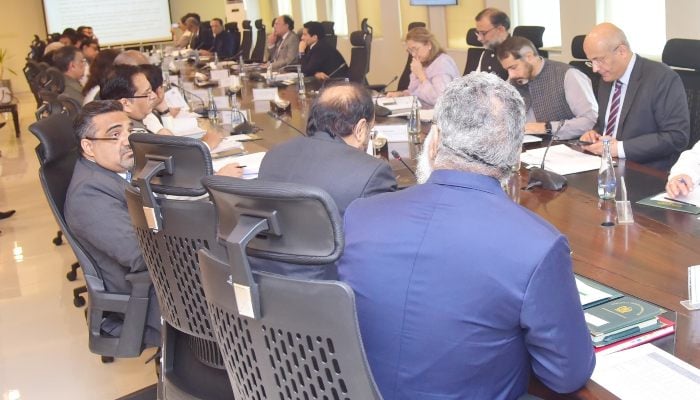ECC approves Rs72bn housing subsidy for 50,000 new units
First-time homeowners to get up to 20-year housing loans under new scheme
July 26, 2025

- Scheme targets first-time homeowners with valid CNICs.
- Scheme offers loans up to Rs3.5m at fixed markup.
- No processing fees or prepayment penalties under scheme.
ISLAMABAD: The Economic Coordination Committee (ECC) of the Cabinet approved a mark-up subsidy scheme for 50,000 housing units on Friday, with total budgetary requirements estimated at Rs72 billion for the current fiscal year, The News reported.
The initiative, designed in collaboration with the Ministry of Finance, State Bank of Pakistan (SBP), and the Ministry of Planning, Development & Special Initiatives, aims to facilitate housing finance for first-time homeowners holding valid CNICs and not currently owning any residential property. Beneficiaries will be eligible for financing of up to 20 years.
The scheme offers subsidised fixed rates of 5% for loans up to Rs2 million and 8% for loans above Rs2 million and up to Rs3.5 million for the first 10 years, with market rates applicable thereafter.
The facility covers the purchase or construction of houses up to 5 Marla or flats measuring up to 1,360 square feet, with a 90:10 loan-to-value ratio. No processing fees or prepayment penalties will be charged.
To encourage participation from financial institutions, a 10% first-loss risk-sharing arrangement will be provided, covering commercial banks, Islamic banks, microfinance banks (MFBs), and the House Building Finance Corporation (HBFC).
The total budgetary requirement is estimated at Rs71.98 billion over 20 years (Rs61.98 billion for mark-up subsidy and Rs10 billion for risk coverage), with Rs3.927 billion required for FY 2025-26. The scheme aligns with the government’s vision to promote affordable housing for low-income segments by reducing financial barriers and encouraging private-sector participation through risk-sharing mechanism.
The State Bank of Pakistan (SBP) has endorsed the scheme’s design to ensure effective outreach and compliance with eligibility criteria. An implementation mechanism for a markup subsidy and risk-sharing scheme for affordable housing finance has also been devised.
The Pakistan Housing Authority Foundation will manage the scheme on behalf of the government. The government will provide an appropriate amount for publicity and management of the scheme.
The exact amount will be worked out in consultation with PHAF and Ministry of Information and submitted for allocation subsequently. This ministry recommends adopting it refreshed end relatable title for the scheme to enhance public outreach and engagement.
In this regard, three options are proposed for consideration including (i) Apna Ghar — Roshan Mustaqbil (ii) Mera Khaub — Mera Aashiyana (iii) Mera Ghar — Meri Jannat.
According to an official announcement made by the finance ministry, a meeting of the Economic Coordination Committee (ECC) of the Cabinet was held under the chairmanship of Federal Minister for Finance and Revenue Senator Muhammad Aurangzeb to deliberate on a range of important agenda items concerning industrial growth, environmental policy, skill development, housing finance, and telecommunications.
The ECC reviewed and endorsed a report presented by the Ministry of Commerce on industrial competitiveness and export-led growth of the steel sector, in alignment with the National Tariff Policy 2025–30, aimed at reducing production costs and enhancing export competitiveness.
The committee also approved a summary by the Ministry of Commerce for filing an appeal with the Supreme Court of Pakistan against the decision of the Lahore High Court regarding the grant of gas/RLNG tariff concessions to M/s Ghani Glass Ltd.
The committee found the appeal tenable in light of the fact that concessionary energy tariffs for five export-oriented sectors have already been withdrawn and are no longer available to any sector.
In a major step toward environmental sustainability, the ECC approved Pakistan’s Green Taxonomy, as proposed by the Ministry of Climate Change and Environmental Coordination.
The chair appreciated the initiative, noting that it was long overdue and would play a vital role in facilitating access to financing for green projects in the country.
To support skills development through outcomes-based financing, the ECC approved a government guarantee of Rs1 billion for issuance of Pakistan Skill Impact Bond (PSIB), as moved by the Ministry of Federal Education and Professional Training.
The committee encouraged the ministry to gradually move towards adopting the public-private partnership model and to explore undertaking similar initiatives using its own balance sheet, thereby reducing reliance on sovereign guarantees.
The committee also urged the ministry to develop a comprehensive, integrated database of the housing sector in coordination with relevant federal and provincial stakeholders, in order to ensure better targeting and effective implementation of the scheme.
The ECC was briefed by the Ministry of Industries and Production on the status of availability and pricing trends in the vegetable ghee and oil market.
While noting the ministry’s assurance regarding adequate national stock levels, the committee expressed concern over the limited pass-through of declining international prices to domestic consumers.
It advised vigilant monitoring to prevent price distortions and potential cartelisation, and emphasised the need for active coordination with the Competition Commission of Pakistan, National Price Monitoring Committee (NPMC), and provincial governments through the Ministry of Industries and Production.
The ECC approved a proposal by the Ministry of Information Technology and Telecommunication for the revision of charges for Radio-Based Services (RBS).
The committee directed the ministry to ensure periodic revision of RBS charges every three to five years, aligned with ongoing economic changes and technological advancements in the sector.
The committee also endorsed a revised composition of the advisory committee overseeing the release of IMT spectrum, which is critical for improving next-generation mobile broadband services in Pakistan.
In conclusion, the ECC approved the formal declaration of ship breaking and recycling as a recognised industry, as recommended by the Ministry of Maritime Affairs.
However, the committee instructed the ministry to coordinate with the Power Division and share relevant data on power consumption patterns in the sector, to enable accurate assessment of the implications of applying industrial power tariffs in place of the existing commercial rates.











